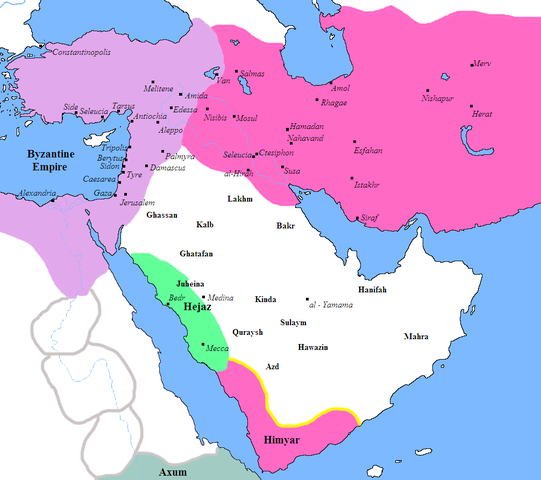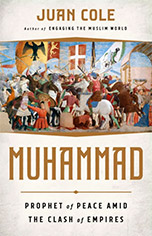Ann Arbor (Informed Comment) – This is the second installment in a series on Sam Harris’s terrible, horrible, no good, very bad book, “The End of Faith: Religion, Terror and the Future of Religion” (Norton, 2005). Part 1 is here.
On page 31, Harris says, “It is clear, however, that Muslims hate the West in the very terms of their faith and that the Koran mandates such hatred.”
Theories that religious minorities are hostile to the mainstream society and working to undermine it were popular in Central Europe in the 1930s and it is tragic and odious to see Harris repeating these tropes.
It is in any case hard to know what Harris’s assertion even means. 90% of Muslim-Americans say that they are “proud to be American.” That doesn’t sound much like “hatred of the West.” And for those Islamophobes who say things like ‘oh, gee, 10% of American Muslims aren’t proud to be American, they must be terrorist,’ we should remind them that Michelle Obama said her husband’s election was the first time she was proud of her country. Being a critic of your country for its flaws is not the same thing as being a terrorist, though the American Right wing wishes it were.
The Qur’an or Koran, the Muslim scripture, grew up 610-632 AD in the Roman Empire and on its frontiers, and so is part of the “West.”
From 603 to early 630 AD, the eastern Roman Empire and the Sasanian Empire of Iran were locked in a brutal world war, which they fought in the Near East, Anatolia, and even the Balkans.
The Iranians invaded Anatolia and then came on down into Syria. In 613 they took Damascus. The Qur’an (Rome 30:1–6) likely refers to this fall of Damascus: “Rome lies vanquished in the nearest province. But in the wake of their defeat, they will triumph after a few years. Before and after, it is God who is in command. On that day, the believers will rejoice in the victory of God; he causes to triumph whomever he will, and he is the Mighty, the Merciful. It is the promise of God; God does not break his promises, but most people do not know it.”

Pre-Islamic Arabia. h/t WikiMedia .
So the Qur’an predicts the eventual victory of the Christian Roman Emperor, Heraclius (r. 610-640). And it identifies the triumph of Heraclius over the Iranian, Khosrow II, as “the victory of God.”
So I don’t think, you know, the Qur’an is telling Muslims to hate “the West.” Seems to me like it is cheerleading for the West.
One reason I believe the Qur’an took this stance is that it disapproves of aggressive war and refusal to negotiate, and the Sasanian Empire had launched an aggressive war on Eastern Rome, taking Syria and Egypt, and refused to dicker. I discuss all this in my book,
You could object that most medieval Muslim authorities didn’t read this Qur’an verse the way I am reading it, as a historian. Well, you have to make up your mind. Are you criticizing what the historical Qur’an says? Or are you criticizing a strand of Muslim interpretation of it?
So what proof does Harris provide of his hateful allegations?
He quotes the Qur’an 9:73 and 9:123.
Chapter Nine of the Qur’an, “Repentance” (Tawba) is about the attack on Muhammad’s early commonwealth in Medina and Mecca in late January of 630 by the pagan Hawazin tribe in alliance with the pagan Thaqif tribe of Taif. These tribes worshiped North Arabian deities and rejected Muhammad’s preaching of monotheism. Thaqif was said to have a “god stone” representing Allat, the Arab Athena.
Hawazin pastured in northern Arabia near to Sasanian Mesopotamia (what is now Iraq, then under Iranian rule). I think it is likely that they were allied with Iran and attacked Muhammad in part because he was pro-Roman.
Mecca had just acclaimed the Prophet Muhammad, who had peacefully entered his city of birth on January 10. The combination of Mecca and Medina made for a new commonwealth in Western Arabia, and the Hawazin and Thaqif were against any new authority forming in the area that might detract from their independence.
Muhammad’s Believers went out and met the fierce, aggressive enemy at Hunayn south of Mecca.
I wrote,
- “Repentance 9:25 addressed those valiant Believers who did go out to the battlefield: “God has already helped you in many regions, and on the day of Hunayn, when your multitude was pleasing to you; but it did not avail you at all, and the earth, vast as it is, was made narrow for you, and you turned about, retreating.” The battle began badly, with a rout of many of the Believers, despite what appear to have been their superior numbers. This setback proved temporary, since the next verse (9:26) says, “Then God sent down upon his messenger his Peace [Sakina], and upon the believers, and he sent down invisible hosts, and he chastised the pagans; and that is the recompense of the pagans.”
Some of Muhammad’s Believers in Mecca were only lukewarm followers, and begged off going out to fight (Repentance 9:42–47, 101). There was a faction of so-called Believers who felt it was all right to question Muhammad’s judgment and to decline his orders. The Qur’an calls them the “Hypocrites” (munafiqun) and says Muhammad let them get out of fighting. Some of the Bedouin around Muhammad, and some of the people of Medina, it says, are these “Hypocrites” who are insincere or weak in commitment.
So this is the context of the verses Harris quotes
9:73 says,
“Prophet, struggle against the pagans and the Hypocrites and be severe with them. Their refuge is hell, the worst of destinations!”
The word for “struggle” here is the one from which the term “jihad” comes. But the root j-h-d in the Qur’an does not mean “to fight.” It means to struggle ethically. I explained it here.
Harris uses a translation that gives” “Prophet, make war on the unbelievers and the hypocrites and deal rigorously with them. Hell shall be their home: an evil fate.”
Kuffar does not mean “unbelievers” in the sense of non-Muslims. In the Qur’an, it means the “impious,” i.e., “pagans,” hostile followers of the North Arabian gods. The Qur’an says of pagans that they have their religion and Muhammad has his.
The Qur’an says of Jews and Christians that their God and the God of the Qur’an are one: The Spider 29:46 says, “Debate the scriptural communities only in the best of ways, except for those who do wrong. Say ‘We believe in the revelation sent down to us, and the revelation sent down to you; our God and your God is one, and to him we have submitted.’”
The Table 5:82 says of the Believers, “You will find that the nearest to them in love are those who say ‘We are Christians.’”
While Christians and Jews, like Muslims, can sin or *do* impiety (kufr), it would be ridiculous to say that they belong to the sociological group, the Impious (al-Kafirun). The Impious are the pagans.
And jaahid here does not mean “make war on.” Since the hypocrites are Muslims, even if bad Muslims, it makes no sense that Muhammad would make war on his own followers, though he was obviously disappointed with them.
Rather, the Qur’an is telling Muhammad to struggle ethically against these two groups, the hostile pagans and the lukewarm Muslims.
Likewise 9:123 just tells the Believers at the time of the Hunayn defense to fight the hostile pagans in the vicinity and to be severe toward these aggressors.
Sam Harris has not actually read the Chapter of Repentance in the Qur’an nor has he read any accounts of the Battle of Hunayn. He just got those mistranslated quotes on the internet without any context. And he said that the Qur’an is telling believers to hate “the West” (whatever that was in the 7th century) and telling them just to go out and kill random “unbelievers.”
Even if some traditionalist Muslims do think Christians are kafir or impious unbelievers, and even if they might see the root for jihad to imply fighting, they do not think it is all right to go roaming their neighborhoods looking for non-Muslims to murder, as Harris monstrously implies.
Harris is as guilty of a blood libel against Muslims as medieval Christians were against Jews.
The Qur’an allows self-defense on the battlefield, as do Church Fathers such as Augustine and Ambrose, and as did a Roman theorist like Cicero. But it strictly forbids murder and likens killing one person to killing all humankind.
Ironically, the quotes Harris chose show that the Believers had to fight off bellicose pagans, who were likely allied with Iran, precisely because Muhammad and the Believers were rooting for the Roman Empire (“the West”) to win against the Sasanians. In other words, they show exactly the opposite of what Harris maintains that they show.
That he can be so wrong is because he is both ignorant and malicious.



 © 2026 All Rights Reserved
© 2026 All Rights Reserved